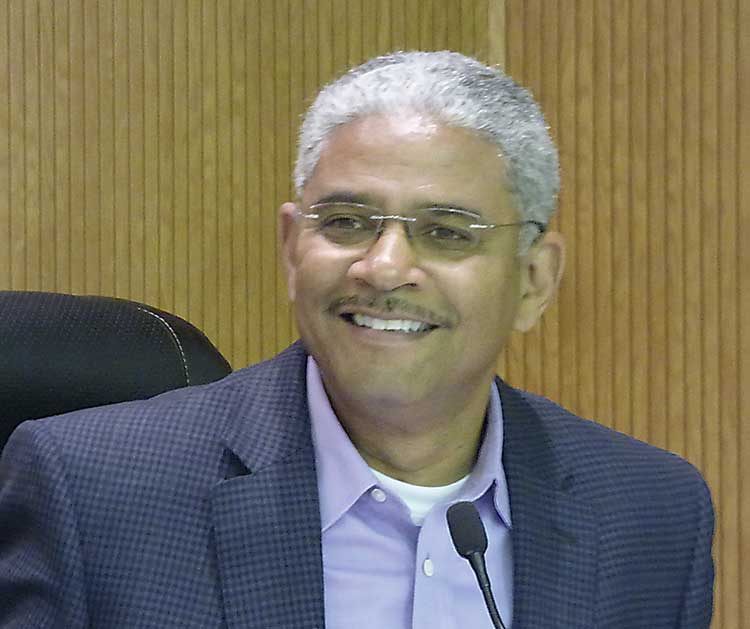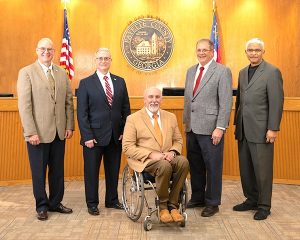A motion to have Fayette County Administrator Steve Rapson removed from the front-end of the grievance policy process failed on a 2-3 vote at the Nov. 8 meeting of the Fayette County Commission.
The item was placed on the agenda by Commissioner Charles Rousseau who cited recent concerns about the grievance procedure, including those stemming from employee complaints pertaining to the E-911 Center. Rousseau asked if there was another approach to grievance procedure other than having Rapson be the initial point of contact when a potential grievance is filed.

Under county policy, a grievance filed by an employee is first viewed by Rapson, and without any investigation, to determine the grievability of the complaint.
County attorney Dennis Davenport noted that Rapson essentially serves as the gatekeeper for potential grievances.
As noted by Rapson and Davenport, a grievance, by policy, is a claim initiated by an employee alleging:
• That the employee’s employment or productivity has been adversely affected by unfair treatment;
• Unsafe or unhealthy working conditions;
• Erroneous or capricious application of county policies and procedures; or
• Unlawful discrimination
Also according to policy, areas that cannot be grieved include:
• Issues which are pending or have been concluded by other administrative or judicial procedures;
• Work assignments which do not result in a demotion or salary reductions;
• Budget allocations and expectations, and organizational structure, including the person or number of person assigned to particular jobs or units;
• The content or rating of a performance evaluation: and
• Adverse reactions (those where the county engages in an action against the employee)

Rousseau maintained that the final deciding party, the county administrator, should not be the same individual that initially views the complaint.
Rousseau’s request was that the grievance policy be amended to have another party or parties take the first-look at grievability and to take Rapson out of the front-end portion of the process.
Commissioner Steve Brown agreed with Rousseau’s suggested approach, saying the final arbiter does not need to be involved in the beginning of the process.
When the vote was taken, commissioners Chuck Oddo and Randy Ognio, along with Chairman Eric Maxwell, did not agree.
The vote which eventuated in a 2-3 defeat of Rousseau’s motion, was precluded by a lengthy explanation of the complaint process, and the role the county administrator plays, by both Rapson and Davenport.
Davenport stressed that the conditions outlined in the policy under which a complaint could be determined to be a grievance is quite clear.
“(The language in the policy) is not subjective. It’s very objective. And the objectivity is on the page is clear as a bell,” Davenport said. “The county administrator is not making a determination on the merits of the complaint. (He only determines) if this is a proper grievance. There is no pre-judgment on the front-end. He’s the gatekeeper. If you don’t have a grievance it can’t get through the gate.”
If determined to be a grievance, Rapson sends the complaint to the appropriate person to initiate the grievance process, Davenport explained.
If the process brings the matter back to Rapson, as the final decision-maker, it is then that he makes the final determination, said Davenport, adding that Rapson would not have been involved in the investigation.
Davenport also noted that the outcome of the grievance would likely be determined before needing to come back to Rapson for a final decision.
Rapson during his comments noted that, during the past six years, only one out of approximately 11 grievances made it back to him after going through the process.
Referencing the complaint from the E-911 Center on issues such as harassment and bullying, Rapson said, “Those don’t even come to me. They come to (Human Resources Director Lewis Patterson). Lewis conducts an investigation and, at some point, brings me the completed investigation. We sit together and see if there are actionable items in regard to disciplinary actions. I have never, in six years, been involved in anything on the front-end of a disciplinary and turned around and adjudicated it on the back-end.”
Rapson again reiterated that he has no involvement in the harassment policy.
The discusion among commissioners continued for a number of minutes before the vote was taken.













Leave a Comment
You must be logged in to post a comment.